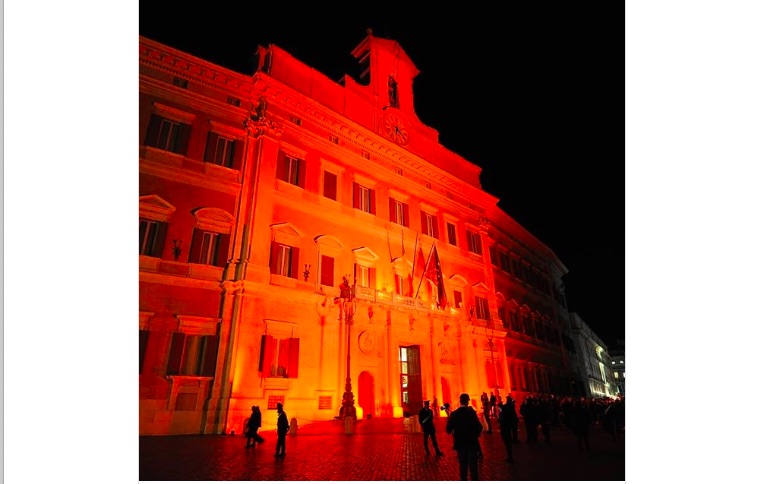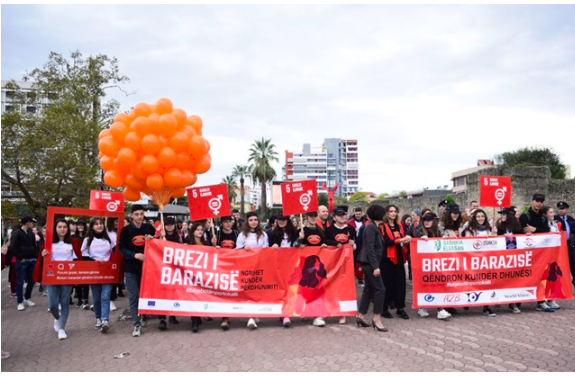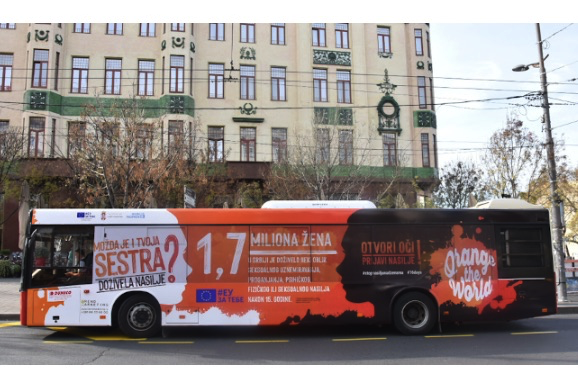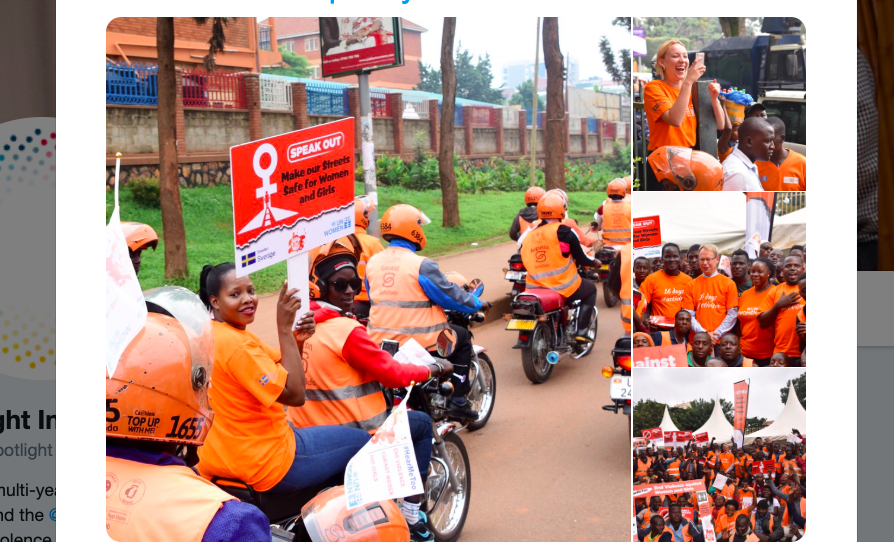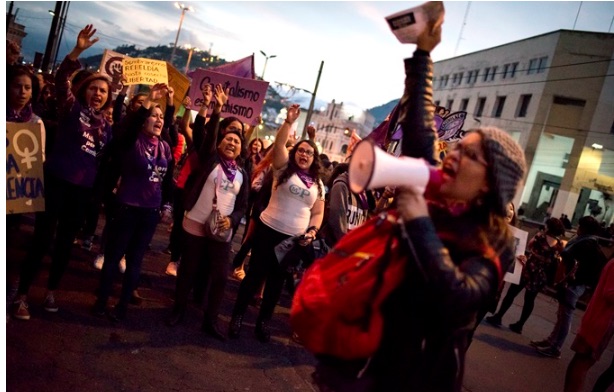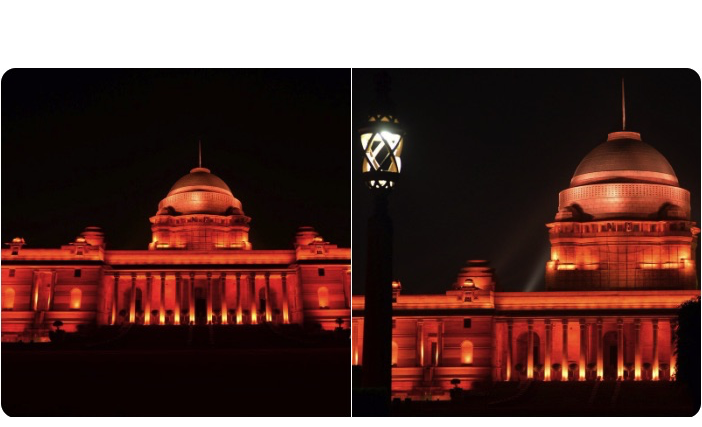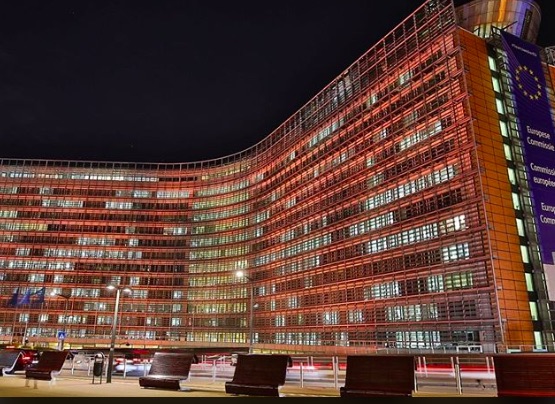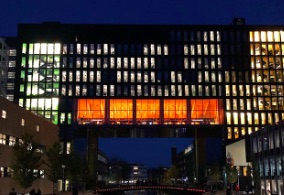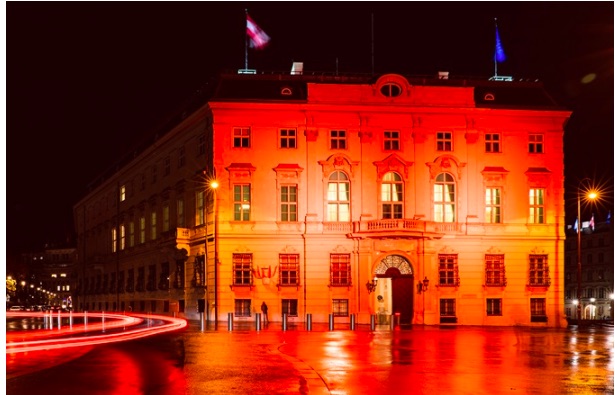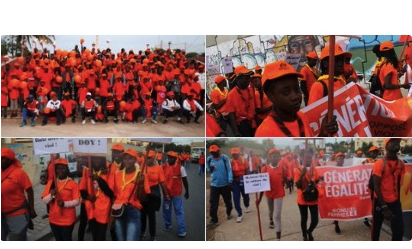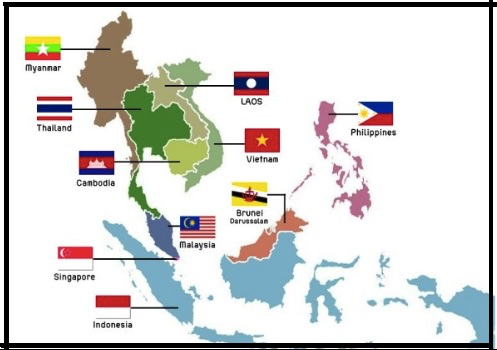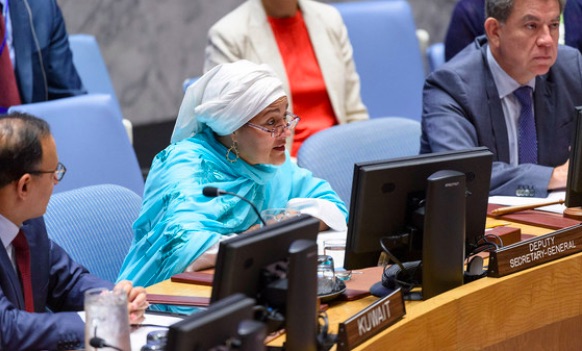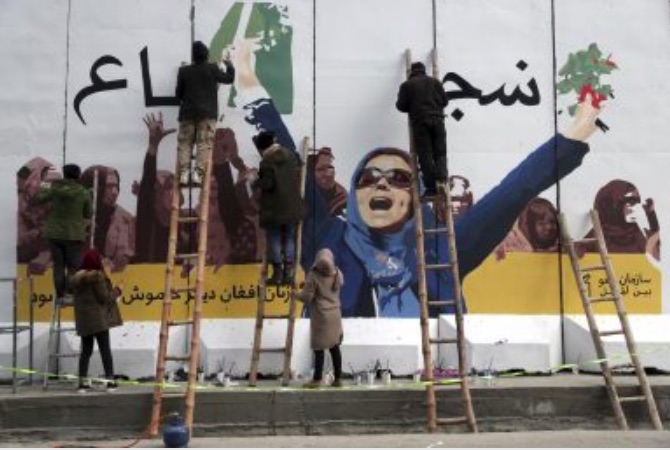. . WOMEN’S EQUALITY . .
An article by Entrompe de Falopio in Kaosenlared (translation by CPNN)
Within the framework of the “Women and the Construction of a Culture of Peace” project, we present an interview with REBECA MADRIZ, militant Feminist, member of the Gender with Class Foundation created in 2008 and a lawyer by profession

Venezuela has been experiencing confrontation and conflict between political positions that have formed two irreconcilable or seemingly irreconcilable poles. How do you see the current stage of that conflict or polarization?
RM: In the first place, the level of political polarization that exists in Venezuela is unique, even when compared to the rest of Latin America. It is a complex situation with serious effects on the Venezuelan people, aggravated by the interference of factors external to the country.
There are very worrying levels of this polarization as it is expressed in the daily life of the life of Venezuelan women and men. In principle it has to do with the violence and intolerance encouraged by political factors, where the media have a leading role. There are outbreaks of fascism expressed in very radical sectors. They have been repeatedly denounced as a hatred that has no basis or justification, but which is expressed specifically in levels of political violence especially against popular sectors, There are alarming aspects of violence, extreme discrimination , hate speech, physical violence, racism, misogyny. Hate crimes have occurred for political reasons that have taken the lives of Venezuelan women and men, which is an element of deep concern.
In this sense, the call for national dialogue is a priority, because it is precisely the national interest, for the future of the country and the Venezuelan people. Unfortunately there are undemocratic sectors that are blocking this possibility. I have no doubt, that dialogue is a national and patriotic feeling, because it is about putting the Venezuelan people above political differences, and settling differences within our Constitutional and democratic framework.
In Venezuela, the people were historically excluded from politics, but thanks to the context of participatory and leading democracy our voice is heard today today. But there is a non-democratic sector of the country that does not want the people to take part in power. They seem to believe that we are in past centuries and that this is the kind of democracy that gives citizenship only to a privileged sector while denying it to the great majority of the people. It must be denounced that one of the political sectors in our conflict has a very serious level of anti-national bias, which is expressed in their refusal to dialogue. This does not support the democratic spirit of the country, but rather it is detrimental. And to this we must add – because it is impossible to talk about Venezuela without putting this in context – the interference of foreign factors, an entire international coalition that aims to overturn the route validated by the Venezuelan people with the Constitution since 1999.
Now, polarization is also expressed in everyday life, we see families, work, circles of friendships torn apart by that polarization. However, I still believe that polarization passes to a second level of importance when we evaluate that this is the most complex situation we have experienced, due to the international threats and military intervention that have been made against the country. It is our position as feminist militants that every scenario of war conflict, every scenario of conventional warfare, is a threat to women and a violation of human rights. We have made significant gains, and we do not want to sacrifice them and much less to turn our bodies into the spoils of war.
This international threat exacerbates our polarization, aided by the violence expressed by the most radical undemocratic sectors. This international pressure is not a small thing, because it is led by the US that it is the world’s first military power, that has shown its criminal side in interventions in sister countries. In our case, we hope that internal conflicts can be resolved by Venezuelan women and men without foreign intervention.
Here is the challenge in everyday life for the social and popular movement. We call first the feminists who militate in the Venezuelan opposition, who also fight for a life free of violence, to locate a common agenda, always within the framework of respect for the country’s sovereignty, human rights, and democracy. These are the key points, determinants of what we cannot be willing as a people to yield or sacrifice. We are obliged to work together to understand and overcome what is at risk in Venezuela today.
In particular, the political conflict how it has affected women and dissident sexualities
RM: The level of polarization in the country today is not neutral, of course; it is about the rise to political power of sectors of the Venezuelan people that were historically excluded. This polarization produced a reaction that has manifested itself over twenty years of political process in several very serious events for the country: the oil strike, coup d’etats, sabotages in different instances, among others. Scenarios that have demonstrated a claim to return to the political power of the elites of the right, regardless of the effects. This has had very serious consequences in the Venezuelan people. The unconventional war, the economic and financial blockade, has very serious consequences on the human rights of the Venezuelan people. In the specific case of women, we have become the center of economic warfare and unconventional warfare that has been unleashed against the Venezuelan people.
First, one of the fundamental strengths of the Bolivarian Revolution has been its social policy, in which women are placed as a priority, because we continue to be the majority of the poor in the country. As a result of this process and the developed democratic context, we, as women, have experienced a significant expansion of citizenship. And besides, feminism has managed to shed some of the burden of prejudices that weighed on it. There has been an organizational explosion of women fighting in the community, in the workplace, against violence, for sexual and reproductive rights. This has produced a significant empowerment, which added to the history of the feminist and women’s movement in Venezuela, and the political will of President Hugo Chávez and his declaration as a feminist, also allowed us to popularize and demystify feminism. Today the popular organizational expression of women in Venezuela is absolutely overflowing after twenty years of political process.
This explosion has led women to assume a key role in the voluntary community day, which is above 80% female participation. That is why the women’s movement is central to thestructuring of the social force that accompanies the Bolivarian Revolution. We are the majority in social missions, in communal councils, in CLAP, that is, in front of all the forms of popular organization that have been changing and developing,. The combative face of Venezuelan women is a fortress, no doubt, very big.
The economic war, especially since 2013, with a very high peak in 2015, and then in 2018 and 2019, when it began to be expressed in hoarding, speculation, bachaqueo and attack to the currency was intended to demobilize to a large extent the popular movement that was the social support of the Bolivarian Revolution.
The intention of removing women from the community political day is beginning to be expressed with the disappearance of fundamental products for women and mothers: sanitary napkins, absence of contraceptives, diapers, milk for the kids. That is, a series of products that were especially linked to women, the head of household, the housewife, the working woman. They took us out of the community political activity, voluntarily, to get us in an 8-hour queue. Recall 2015 where there were queues of 8 and 12 hours to access a package of diapers, a package of milk. There I think there is a very key element that has to do with the objectives and effects of that war in the lives of women.
If in conventional wars, our bodies are used as spoils of war, I believe that this unconventional war is meant to take us out of the political, public sphere. It is related to detriment of the material conditions of the Venezuelan people, of violation of fundamental human rights, of the right to access to food, to health As a direct consequence of the situation of international blockade, this had and has a heartbreaking impact on the daily life of Venezuelan women.
The effects on the lives of women is alarming. We are forced to defend the human rights that we believed were already assured. We consider that the systematic attack that the country is experiencing today can be classified as a crime against humanity. The context today shows us that then we have to be on the street fighting to have access to food, for light, water, food and medicine, which for us are fundamental human rights, already acquired, and guaranteed.
To speak today of our historical struggle, might seem out of context elements in a scenario in which we have to fight to have food every day, to have access to drinking water; however, it is obviously part of our political agenda.
The scenario of war in the country makes the situation more complex. The health system is vulnerable due to lack of vital materials. Deaths from clandestine abortions and unwanted pregnancies are increased due to the fact that we do not have access to contraceptive methods. The violation of specific rights becomes more complex. The health system is forced to give priority to antibiotics, and contraceptives may not be a priority in a scenario in which we are fighting for the most basic elements of subsistence.
Finally, the scenario of war and all that frustration that has produced the change in our daily lives, in the level of life achieved, all the psychological pressure to which we are subjected daily, have expressions in the home. This is the place that should be the safest, but which is sometimes the most dangerous for women. To the burden of structural machismo that we already had, we must add the frustration scenario of a frustrated male supplier, who discharges his violence, on those whom he continues to believe are his property: the body and life of women.
We have made progress in women’s rights in Venezuela with legal framework, institutional framework, a movement in full swing and in full demand, in full tension with the institutional framework, a tension for progress. However, war has indeed been attacking this agenda, as I was saying to you as our agenda for the strategic objective of equality, has had to adjust to this basic struggle for survival, for the subsistence of the most elementary things. I do believe that women are at the center of this war which is intended to demobilize the main social force of the historical project of the Bolivarian Revolution.
There are those who believe that violence can be increased either by an invasion or by open civil war, what impacts would this have on the lives of women and dissident sexualities?
RM: Either scenario, of course, would have a negative effect on the entire Venezuelan people. In the case of women, a foreign military intervention as history has told us, and as the testimonies of the women victims confirm it – the presence of foreign military increases sexual violence and physical violence against women. An intervention in our country would mean an invasion not only to our territory but also to our body. The use of women in these scenarios, to undermine the dignity of peoples, has been a recurring practice that has been used by all these international military coalitions when they arrive in a country. It is not only the physical annihilation, but it is the moral annihilation of that population, that is done on the body of women, to degrade, to undermine dignity, to vex, humiliate, such as the use of systematic rape, the use of girls for sexual purposes, physical violence. Of course, all of this constitutes a very serious risk to the lives of Venezuelan women. Likewise, in the case of a civil war in the country. That is why we strongly reject the intention of putting war as part of the political options as an undemocratic sector of the Venezuelan opposition has claimed.
There is an element that is the profound patriarchal characteristic of wars: the use of weapons is a structural part of the patriarchy, that model of masculinity in which wars and confrontation are the way to the solution of any difference. Within the framework of a society that has begun the 21st century with very large elements of progressivity, our people cannot and does not deserve it. Despite our polarization, there is not even the slightest will of the great majority for either one of these two scenarios, precisely because of the democratic tradition we have as a people. Venezuelan women refuse both of these two scenarios, both deeply patriarchal, of reaffirmation of power, force, hierarchies and supremacy, because we understand that the dead and dead of that war are the children of the people. The great majority of Venezuelan women refuse to give up on the peaceful route, because finally the casualties of any warlike scenario, of armed conflict, are the men and women of the people.
We view with great concern any scenario of military intervention by foreign armies in Venezuela, to solve a problem of Venezuelans. We have the democratic and constitutional mechanisms to solve our problems. Indeed the consequences on the lives of women, would be to return to another century. I have confidence in the maturity, level of awareness and politicization of a people that is capable of being above those who invoke any kind of confrontation in the country. The path of dialogue is the first scenario for us. We reject any option that involves the sacrifice of human lives of Venezuelan wmen and men in an armed and military intervention.
We look towards the future, without giving up our rights, or losing human lives in our country. We seek solutions and alternatives that allow us to get out of the situation we are going through. I believe that ours is a people with a democratic culture and, above all, a peaceful one that can survive and provide a promising future that allows us to continue the progress and progressivity of our fundamental human rights.
In both halls similar stories are heard. The armed conflict affected the lives of all and left Do you see the impact of geopolitics on the Venezuelan conflict, what and how would it be?
RM: I am convinced that today in the geopolitical scenario, the conservative forces have advanced and there is a recolonization project especially in Latin America that has already produced some regression in the continent. The return of some right-wing governments in Latin America show how that agenda is being imposed. In the case of Brazil and Argentina, unlike the line headed by Venezuela under the leadership of Hugo Chávez, the democratization and social progress of the people has been sacrificed to neoliberal policies.
In the case of Brazil, a democratic process was sacrificed in the case of Dilma Rousseff. One of the first actions after her departure was to eliminate the ministry of women. Bolsonaro represents a religious fundamentalist attack on human rights, dismantling the advances of a feminist approach. In the Argentina of Mauricio Macri the conditions of the population have deteriorated.
(Continued in right column)
(Click here for the original Spanish version of this article.)
Question related to this article:
Do women have a special role to play in the peace movement?
What is really happening in Venezuela?
(Continued from left column)
We have also seen with alarm, the murder of emblematic leaders of the popular and feminist movement, such Marielle Franco in Brazil and Berta Cáceres in Honduras, who embodied feminism in the struggles of the villages. We fear, of course, that this is the same script that is intended to be applied in Venezuela to quell popular struggles. There are other complexities on the continent, such as the case of Ecuador, where there was a reconfiguration of internal politics with a radical turn to the right.
On the other hand, the international integration mechanisms that had been promoted by Venezuelahave been sabotaged and dismantled, and a coalition of right-wing countries has embarked on a crusade to isolate Venezuela diplomatically and internationally, They have attacked CELAC and against UNASUR they have created their own coalition called PROSUR. An official of the Venezuelan government has said that it would be more accurate to name it PRONORTE because it is finally the application of the imperialist script and the recolonizing process of the continent, in which these governments act as guard dogs of foreign interests.
For those promoting that scenario, Venezuela is still deeply problematic and it continues to be a bad example, because the people fight and resist, who are not going to support a neoliberal reform. In this country despite the media, economic, unconventional warfare and – in the midst of the toughest circumstances we have had – we see a deeply conscious people, a people on the street, a people defending their sovereignty, their natural resources and defending the rights we have conquered. That is why they see us as a bad example, because we continue to insist that despite the circumstances there is a constructive alternative for the peoples of the world. Now, we must undoubtedly strive to repair the mistakes we have made as popular and progressive governments in recent years.
Another key factor in Venezuela is oil as the main energy resource. We are still flooded with the largest oil reserves in the world, and it is obvious that due to its proximity to the US, they have great interest to regain control over them.
There are also historical reasons that make us a bad example for imperialism, including the heroism of our people, the capacity for resistance and our certainty that we can move forward. Our history, our economic energy with oil and the political will of Venezuelan democracy means we are a bad example for the pretensions of recolonizing the continent; These are the fundamental scenarios of this geopolitical reconfiguration, of this new chess game that seeks to isolate Venezuela economically, militarily, diplomatically and politically.
Fortunately, in the face of the threat of foreign intervention, the response has been the solidarity of the great majority of the world’s people who refuse to let Latin America be used again as a war scenario in order to meet the designs of the government of the USA. In the context of their internal electoral elections scenario, they always need a trophy, but we are not willing to have that trophy be based on the sovereignty and life of Venezuelan women and men.
For the dialogue between the opposing poles, what elements are needed?
RM: The dialogue scenario has always been present. On the international stage there is a political will to accompany the dialogue. We insist that this is the way to settle our differences and although it seems obvious, we have to insist because every day we hear radical anti-democratic sectors rejecting dialogue, and asking for a foreign intervention. And specifically, every time a dialogue process has begun, the table is quickly left. That said, the scenario of dialogue in the country must put the welfare of the Venezuelan people at the center of the debate.
Now it is true that the Venezuelan economy has a deep structural problem. This should undoubtedly be a central element of the dialogue. The issue of the country’s recovery necessarily goes through a review of the economic structure in Venezuela. Economic actors have to play a specific role, it cannot be the State playing alone, swimming against the current, it has to be with economic actors, looking for alternatives and solutions. In any case the superior interest should be the future of the country. There are some sectors that have received financing from the State for production, but that have capitulated to sabotage, speculation, hoarding. For that, the people demand exemplary sanctions. It is one thing not to sympathize with a political option, but another one very different to play with the people’s right to food, to force a political option. That is a crime, and it must be addressed. Especially important is the transfer of powers to popular power, especially through the Communes, which is key to shielding access to food as a priority aspect. So I believe that the dialogue must transcend polarization and also consider the sectors that defend this country and are willing to work for its recovery.
Another aspect is the reparation of the victims. There are emblematic cases, such as those who have been victimized by their skin color in this country. I see it as a fundamental scenario to address the irresponsible actions of the most radicalized sectors of the right in the country. If there is no justice and recognition of the victims it is difficult to move forward. These victims must not remain invisible and mute, to the eyes and ears of the international community.
Politically, it is a very complex situation. If you ask me personally what the political exit is, I would say that the will of the majority of the Venezuelan people must be respected. We have gone through a series of elections that took place from the municipal councils, to the Presidency of the Republic, in which millions expressed our will. We have exercised the right to vote, our duty as Venezuelan women and men and we hope that this will be respected. and recognized, for its legitimacy, for its constitutionality. It is an afront to Venezuelan democracy to say that, if an electoral result does not favor me then the Constitution is not valid, the election is not worth it. It is a violation of Venezuelan democracy to insist that when a political factor does not agree with an electoral result then the elections must simply be repeated. Any decisions must be in the context of democratic commitment with respect to the Venezuelan institutions and our Venezuelan constitutional framework.
I propose this because it has been said that the opposition does not want dialogue but free elections. And I worry about that, because I voted, freely, consciously, autonomously, with full freedom of conscience, and I think that one of the greatest strengths we have is the participatory democratic model. If we weaken it, we run serious risks. So it is not clear what are “free elections” according to that sector. However, I would understand if, given the complexity of international encirclement, that part of the dialogue must debate a scenario that allows a democratic reaffirmation that avoids a violent exit to the situation in the country.
I insist that our route must follow the Venezuelan democratic system. That does not happen if you and I are candidates and if you are elected, then I can ignore you and demand new elections. Such a scenario would be a risk for Venezuelan democracy and that risk has to be the last resort used, so as not to violate our democratic system. However, I also understand that the peace of the Venezuelan people is the superior objective to which we owe ourselves at this time.
Finally, the reform of the State, must be on the agenda. The polarization that the country has today has brought about a situation of state destruction and weakening of the institutional framework, so I think that we must seek a revision of that old institutionality, expired, bureaucratic and dehumanized. We need an institution that adjusts to these times, to the new needs, with a legal framework that makes the State’s action much more effective.
We are challenged to overcome a bourgeois state and its capitalist and patriarchal logic. The situation today makes it imminent that this is an element of the technical and political debate that concerns all the core issues for the country including the economy, agriculture, education, public administration, health, human rights. I believe that this issue is key to making viable and feasible the possibility of building a much more solid route on the peaceful and democratic path that we take as a people.
The University Institute of Peace and Conflicts of Granada argues that “There is negative peace (there is peace when there is no violence), positive peace (there is peace when there is justice) and imperfect peace” How would you apply this statement to Venezuela?
RM: The Bolivarian project has peace with social justice on its route. It has been a recurring element in all the scenarios we have gone through, and it is a central agenda today. If you take away social justice from the Bolivarian Revolution, it is an unfeasible project that would have no reason to exist and you would not have people in the street defending what we have, fighting in CLAP, fighting for water, going out in the streets, rejecting a military intervention in the country. Social justice is necessary to ensure that peace is not that “negative peace” formalism where there is no scenario of violence, but where social inequalities open a gap between privileged and excluded sectors.
Today there are indeed great weaknesses in the entire state network especially in the justice system, which have generated an alarming situation of impunity. Structural changes are needed, because justice remains deeply patriarchal and classist.
In the situation that Venezuela is going through today, of blockade, of economic and financial siege, if we did not have a social protection policy, especially for the most vulnerable sectors, whose economic conditions are increasingly precarious, we would no doubt have a mass mobilization of the people against the government. But that is not the case. Indeed, there is a polarization in the country, but a good part of the Venezuelan population is resisting and defending our social gains. The other pole is also suffering and with a deep discontent but without mass action in the street.
A good part of the mobilization in Venezuela is popular, consisting of sectors of the people that historically have been the most excluded and the most vulnerable. Where those sectors have manifested themselves, the majority decisions have resulted which should be recognized by the internal and international political actors. People defend because there is a political, historical, loving reason, and there is a material reason that also moves people. While we have some sectors trying to eradicate the rights we had acquired, there is also a sector that is trying to protect what we have achieved as a people. So, we have an imperfect peace. It does not ignore the existence of conflict, contradiction, and even violence, but it values the resistance and solidarity of the people to preserve the conditions of life and peace; while understanding the need for structural transformations.
What should be the role of social organizations in the construction and sustainability of a culture of peace for Venezuela?
RM: After the experience we have and have had collectively, in the feminist and women’s movement, I believe that we can set an example of what a route can be for the country. It involves principles and points that are essential, such as respect and defense of democracy and human rights. It is possible to articulate a concrete agenda of political action, of collective action. We in particular as a movement have elements that are sensitive to the whole society, one of them is violence against women. It is a route in which the popular movement can contribute to national understanding, dialogue and articulation of the poles in deep contradiction.
The contribution of the popular movement must be more than words. It must continue to be expressed in action so that the country sees the feminist movement in a common cause. For example, I believe that the reform of the organic law on the right of women to a life free of violence, should be pursued. It is a message that says a lot.
The pacifist tradition of the feminist movement is a tradition closely linked to the fight against war, to eradicate the forms of patriarchal, warlike, hegemonic and hierarchical power. This gives us a moral authority as a movement, as the main promoters of a culture of peace in the country. We women practice this every day as an example. I think this may be the best way to give a message to the country of what is possible, and I am sure we can do it.
Peace is not a specific area of the female gender, nor do women have a natural predisposition for it, but its construction is a task that concerns both sexes equally. However, the fact that women’s mobilizations have often included peace among their demands, as evidenced by the alliance between suffragism and pacifism first, and the recurring unions between feminism and pacifism later, is undeniable. In conflicts that have occurred in Latin America and the Caribbean, women’s groups have played an important role for peace. Do you think that in Venezuela it would be possible to replicate those experiences? Who would be the subjects of these initiatives? What conditions should be met?
RM: As I told you, peace is part of the daily contribution of women. However, there is a very specific agenda, although women are not the “subjects of peace” we are fundamental agents for it and there are examples. In this context of conflict, many efforts have been made for peace and life. We have seen this in neighborhoods of Caracas where there were clashes between violent gangs. Direct intervention by the mothers of young people who are part of these bands, has allowed the community to be pacified through their their maternal authority.
The vision of peace with social justice necessarily comes from women because they are free from violence. To ensure peace in the country, and to ensure sovereignty, justice and peace, we must overcome the patriarchal hegemonic model of sexist violence, of criminal, social, political and imperial violence. To avoid a scenario of negative peace, we must insist that this agenda has to have the structural elements that aim at overcoming class, gender and ethnic inequalities.
I believe that women have a leading role to play for the peace of the country, and for this all women must be the key subjects, with conditions of respect, equality, non-discrimination, plurality, multiculturality, respect for the National Constitution, defense of democracy, and of human rights.
We must start from the most pressing issue, which concerns the common defense of the right to life and dignity. We must avoid a fratricidal confrontation between sisters and brothers and ensure that no foreign army comes to threaten the dignity of Venezuelan women and the sovereignty of the Homeland.
I believe that peace building must have the feminist quality. It is the quality thatfeminism brings from its praxis, and from the accumulated historical and theoretical experience to the conception of peace and justice, against violence, against the warlike model that is intended to impose, which is a culture of dominance, a culture of power, a deeply patriarchal culture. The alternative to that hegemonic vision is that of feminism, is that of women. That is why I believe that what we have a lot to contribute. What we have to give for this construction of peace with social justice requires that society as a whole reconsiders its vision of women and feminizes peace as a strategic route framed in the ethics of care.

